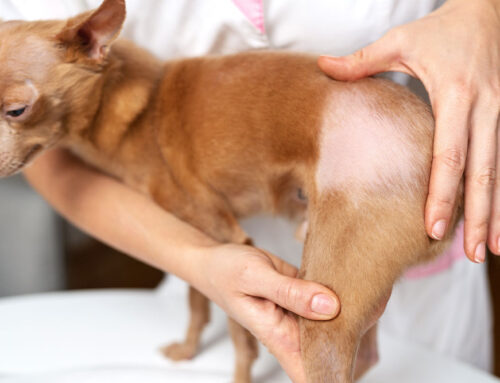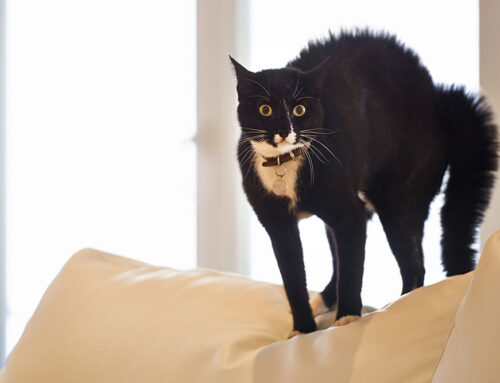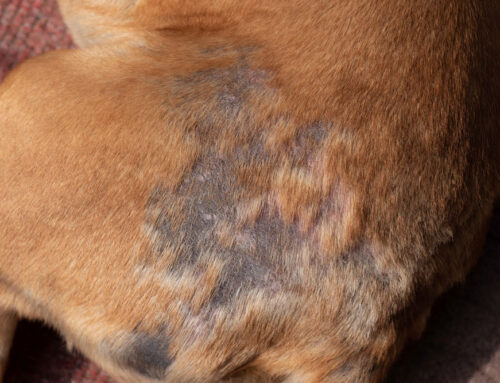Pet poisonings happen far more often than most pet owners realize—the ASPCA Animal Poison Control Center received more than 400,000 calls in 2021 alone! Poisonings are so common, because pets are not terribly discriminating about what they eat, and because many pet owners are not aware of all the toxic items in their home. March is Pet Poison Prevention Month, so the Tidmore Veterinary Hospital team wants to walk you through a tour of your home to identify common toxins, and ways to keep your pet safe.
Pet kitchen toxins
Certain foods contain substances that pets cannot metabolize the same way as people, making them toxic for pets. The most common food-related pet toxins include:
- Chocolate and coffee — Theobromine in chocolate and caffeine in chocolate or coffee cause stomach upset and overstimulate your pet’s nervous system, leading to tremors, seizures, and coma, or death in severe cases.
- Grapes and raisins — The mechanism is poorly understood, but these foods may cause kidney failure in dogs.
- Garlic and onions — Sulfur compounds in the Allium plant family can damage your pet’s red blood cells and upset their stomach.
- Xylitol — This artificial sweetener is common in candy, gum, oral care products, and baked goods, and while OK for people, will cause a dramatic blood sugar drop and liver failure in dogs.
You can reduce your pet’s exposure risk by securing food in high shelves and cabinets, and avoiding leaving food unattended on countertops—resourceful pets will find a way! Train pets to go to a mat or another room while your family is cooking or eating, and restrict kitchen access when you leave the house.

Pet bathroom toxins
The bathroom medicine cabinet is a pet toxin minefield, because most human medications are either toxic for pets, or supplied in too-large dosages. Many over-the-counter (OTC) and prescription medications are toxic for pets, including these common categories:
- Non-steroidal anti-inflammatories (NSAIDs)
- Cold medications
- Heart medications
- Antidepressants
- ADHD medications
Toxic effects vary depending on the drug, your pet’s size, and how much they ingested. Never give your pet a medication that wasn’t prescribed for them, unless directed by your veterinarian, and keep bathroom cabinets and drawers secure. Hang purses and backpacks that contain medications out of your pet’s reach.
Pet living space and bedroom toxins
Those pretty flower bouquets that decorate your living space can be dangerous for your pet—especially if they contain lilies, which are extremely toxic to cats. Check the ASPCA list of toxic and non-toxic plants to determine which flowers you can safely keep inside your home, and those that could cause your pet issues outdoors.
Another common toxin you may keep in your living space or bedroom is marijuana, which is now legal in most states for recreational or medicinal use. While CBD is safe for most pets, THC causes extreme intoxication that often requires hospitalization for supportive care. Keep these items, especially edible formulas, secured in their packaging, plus a secondary container, well out of your pet’s reach.
Outdoor pet toxins
You may store fertilizer, cocoa-based mulch, insecticides, rodenticides, and antifreeze in your yard, garage, shed, or garden. Whenever possible, avoid using these products around your home, and always thoroughly read label instructions before use. Rodenticides and antifreeze are especially dangerous, and can lead to serious illness or death. In addition to ensuring your yard is safe, keep pets on leash or contained inside a fence to avoid encounters with harmful substances on neighboring properties.
What to do if your pet is poisoned
Quick action should your pet ingest or be exposed to a toxin gives them the best chance for recovery. Prompt emergency veterinary treatment can help remove toxins from your pet’s body before they are absorbed, and provide treatments aimed at counteracting negative effects.
Prior to visiting your primary veterinarian or local veterinary emergency clinic, consider calling a pet poison control hotline, whose experts will ask questions about your pet’s health and the toxin exposure. These services can determine if the ingested item is truly pet-toxic and advise you on steps you can take prior to visiting your veterinarian, and they will be available to assist your veterinarian with treatment once you arrive at the clinic. The two main services are the ASPCA Animal Poison Control Center and the Pet Poison Helpline.
Knowing about the poisons in your home will help you keep pets safe and healthy, and the Tidmore Veterinary Hospital team is here to help. Contact us If you need more help to identify and secure the toxins in your home, or if your pet needs a wellness exam or other veterinary care.








Leave A Comment